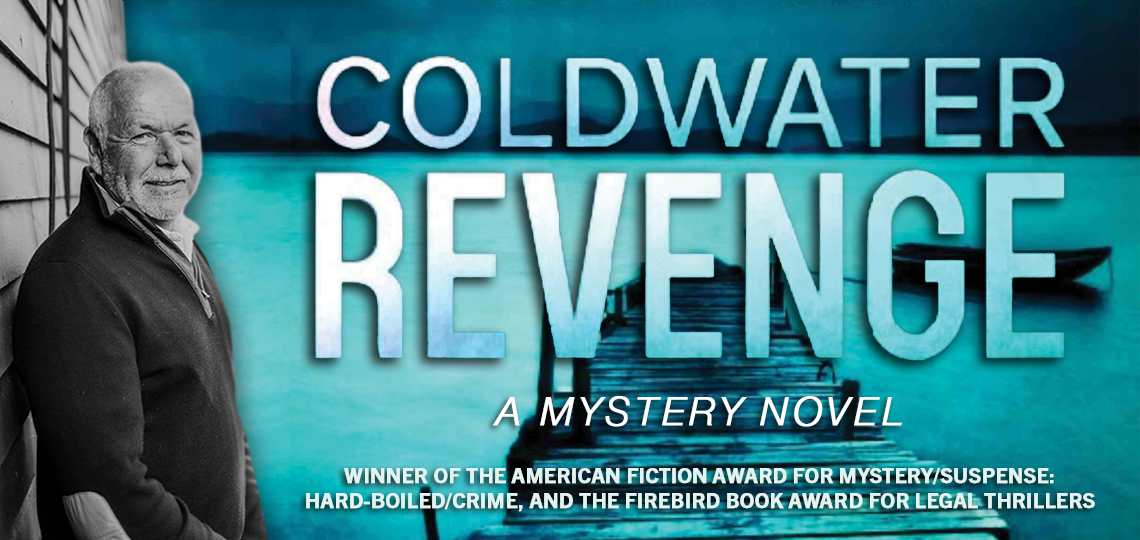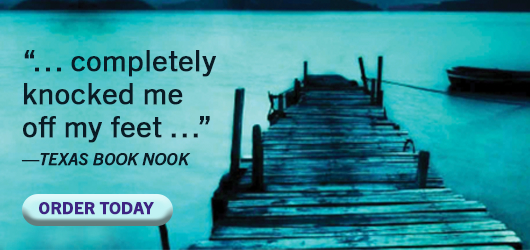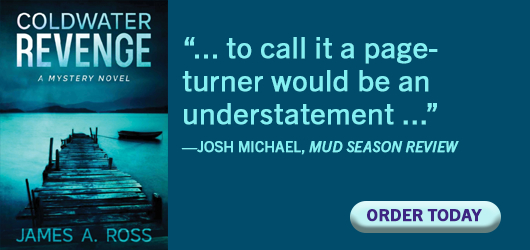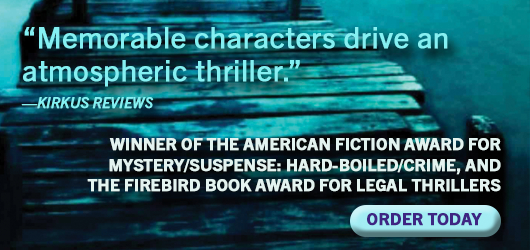It's the characters, not the crime.

Executive Editor Matt Sutherland Interviews James Ross, Author of Coldwater Revenge
One of the very few downsides to living a dynamic, enterprising American life is that you leave little time to write, should you want to. That matters because a life well lived is worthy of reading about. In our minds, the book world is filled with too many writers possessing good language skills but not a lot to say. Something trivial wrapped in pretty words is still trivial.
James Ross, we’d like to thank you for finally sitting down to tell your story, albeit fictionalized, sensationalized, and chilling at times. His excellent new thriller, Coldwater Revenge, is the first in his Coldwater series, and we were impressed enough to seek him out to ask a few questions about how this project came together.
Protagonist Tom Morgan returns home to Coldwater Lake on the United States/Canada border to catch up with family and relax for a week. One morning, he takes his young nephew salmon fishing and you expertly describe the setting of downriggers and tactics for catching a big angry king salmon. You obviously have spent some time on a cold northern lake filled with trophy fish? Did you place the novel in a familiar place?
Coldwater is the town I grew up in, though I’ve changed the name and moved it slightly north for plot purposes. I’ve spent many a happy hour chasing trophy salmon and other outsized fish. The fishing scene in the book is based on my youngest son’s first attempt to land a king salmon. He was eight and the fish weighed only about fifteen pounds less than he did. It was quite a fight.
Early in the book, you recount a story about Tom’s involvement in a high school fight and how his younger brother, Joe, stepped in to save Tom and proceeded to send the other boy to the hospital for a week. From that point on, Tom stops identifying as an athlete and distances himself from friends and family and begins his corporate attorney trajectory, while Joe follows their father into law enforcement and becomes sheriff when the family patriarch dies. But as murders add up and the plot thickens, it becomes obvious that Tom has inherited some solid investigatory skills. Can you talk about the family dynamic you created and how you successfully fused the negotiation tactics Tom learned as an attorney with the needs of a gumshoe?
I had close relatives in law enforcement when I was growing up. And like Tom, I spent several decades on Wall Street doing large, complex commercial transactions. Early in my career, it was clear to me that the two professions have a lot in common. I found it rare that a client, suspect, opponent, or information source, told the truth, the whole truth and nothing but the truth the first time around. Skill, instinct, perseverance, and occasional intimidation were often needed to get past the simple, self-serving fairly tale to something closer to the complex and often contradictory truth. The difference between law and law enforcement in that regard is that each uses different tools and methods and only one normally involves physical risk.
Biotech research plays a prominent role in the story—which we eventually learn is connected to Islamic terrorism as the novel nears its ending. All of which is another incongruous surprise coming from the little resort town of Coldwater. Care to talk about why rural America offers such an intriguing setting for your writing.
I’m not sure I can answer this without the warning: Spoiler Alert. However, with respect to the 5,525 mile long US/Canada border, there are innumerable places (most of them rural) where there is no practical, effective means of stopping VIP (vial in pocket) transfers.

Father Gauss, a heavy intellectual presence in Tom’s high school years and still a prominent figure in Coldwater when Tom returns, takes Tom to task about his hard-driving capitalist approach to life. Continuing the theme of many a conversation between the two, in a letter to Tom, Father Gauss writes: “By all means test your theology—if your education has left you any—with science and the other arts. If a theology can’t stand up to the scrutiny, chuck it. Though I encourage you to remain open to what science and logic cannot explain and to allow for the difference.” Where did the figure of Father Gauss come to you and why do you think his relationship with Tom was a good fit for the book?
The real Father Gauss passed away two years ago. He played a similar role in my life to the one that the fictional character plays in Tom’s. Neither Tom nor I would have ever “risen above our raising” but for the timely influence of Fr. Gauss.
Complexity is a feature of all good thrillers, though you ratchet up the side plots, twists, and entanglements to a splendidly high level. With Coldwater Revenge in mind, can you talk about plotting, keeping track of all the tentacles, and why you enjoy writing in this genre?
Dead bodies have a way of focusing attention. Real life has a way of diffusing it. The mystery genre’s requirement to figure out “who done it,” typically under time pressure, gives structure and tempo to the human drama that many readers find as compelling as the who done it. A good mystery will explore the human comedy as deeply as literary fiction, but with high stakes, fast tempo, and no wandering.
Okay, among many, many wonderful, clever, hilarious lines in the book, my favorite comes at a point in the book when Tom and Joe are discussing motives for a murder—in their mother’s presence—while trying to hide their discomfort at knowing they both have a sexual history with the same woman: “The brothers’ eyes stuttered past each other like wrong-way magnets.” Please talk about your writing process and influences? And, during the writing of Coldwater Revenge, at what point did you realize you were working on something special?
I wrote my first book in college, and published the first one the same year I started to collect Social Security. So it was a long apprenticeship, and my style changed a lot over the years. In the one writing course I took in college, the only specific craft instruction we received was to follow Hemingway’s dictum to “write one true sentence.” It took me years of trial, error, and rejection to realize how inadequate that was as a rule for storytelling. Instruction in other arts, like music, painting, and dance, begins with the basics: melody, harmony, scales, line, and perspective, etc. The art of written storytelling calls for the same knowledge of craft. But I had to discover the specific techniques of plot, characterization, mood, tempo, emotion, conflict, and word pictures on my own; and it took some time.
Book two in the Coldwater series, Coldwater Confession, will be out in April of 2022. What do readers have to look forward to?
Coldwater Revenge is Tom’s story. Coldwater Confession is Joe’s. Tom’s cerebral approach to problem solving and Joe’s physical one come into violent conflict before the murder is resolved.
Click here to sign up for James’s newsletter and read the first chapter of Coldwater Revenge.
Matt Sutherland


